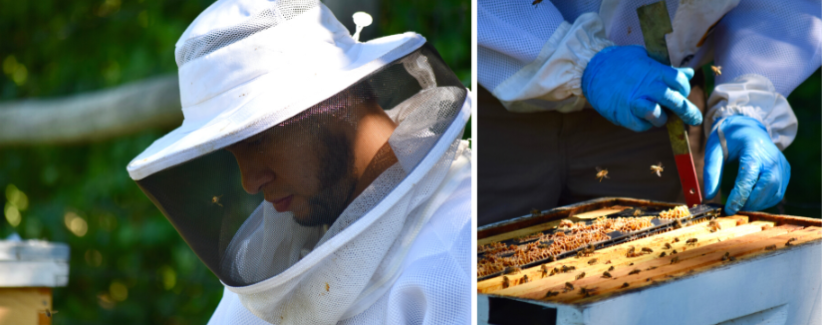A Big Picture Look at Beekeeping on the Farm

Five years ago I accepted the responsibility of taking care of the honey bee colonies at Gaining Ground. At that time, I was looking for opportunities to learn more about beekeeping in the northern hemisphere and about sustainable agriculture. I was hooked as soon as I learned about the farm’s hunger-relief mission, and felt lucky to have the chance to support an organization that aligns with my values.
During the last five years, the apiary has provided pollinator services for the farm’s crops as well as honey for the people who receive food from Gaining Ground. In addition to this, the apiary has served as a study site for the USDA’s National Honey Bee Health Survey for several years and a 2018 study from the University of Massachusetts Amherst. The material provided by the farm has helped to feed the biggest database of honey bee health information on earth, which helps scientists and government agencies research and monitor pests, diseases, and pesticides. It also supports the efforts of these groups to prevent the spread of invasive and newly introduced pests in the United States.
During this time, I have also had the opportunity to confirm previous observations about colony collapse disorder and colony mortality—but also to clarify a few misconceptions related to the proper ways to care for honey bees in the northern hemisphere.
Through my practice over the past five years, I have been able to confirm that starting an apiary with locally-raised genetics will increase its chance of success by at least 50 percent in the first three years.

I’ve determined that installing insulation around colonies is not a requirement over winter, but it reduces a colony’s energy needs and enables the bees to overwinter easily and with less food. The only downside is that making this insulation is time consuming.
In addition to this, I’ve found that feeding the bees with a nutritive diet supplement is a must in case the bees run out of honey or stored pollen at any moment during the season. Honey is a very complex food that provides enzymes, minerals, vitamins, and other bioactive compounds to the bees—and these properties need to be taken fully into account. I have formulated a liquid and solid diet that has shown good results over this time.
It was interesting to learn—through the pesticide analysis performed as a part of our involvement in the 2018 UMass Amherst study—that pollen and wax from the farm showed the presence of Fipronil, Piperonyl butoxide, and Coumaphos at a low hazard level for bees. Interestingly, and thankfully, Neonicotinoids were not detected in our samples. This helped me to confirm that the honey bee mortality at Gaining Ground before 2017 was likely not related to pesticides. (The farm doesn’t use any pesticides, but we know our bees travel beyond our boundaries in their search for nectar.)

The apiary management plan at the farm has been implemented based on an Integrated Pest Management system. Within this practice, we first make clear the goal of our apiary and then we design a decision tree for intervention practices in the colonies. We apply different management strategies to address different problems—related mainly to Varroa mites, Nosema disease, and using medicines as a last resort.
Our apiary’s goal is to keep healthy bees that can provide pollination services in our community. A healthy, well-managed honey bee colony also means we’re a healthy bee neighbor.
This year is the first time in three years that we have decided not to harvest honey at Gaining Ground. It is possible that this summer’s dry and hot weather conditions meant that flowers didn’t produce an abundance of nectar at the right times during the season for our bees, with the result that there is less honey than normal. The bees are currently being prepared for winter and will get insulation in their houses in a few weeks.
I’d like to thank my daughter, Jona Sofia, who has been my assistant in this adventure!
You can read more about David and his beekeeping work at Gaining Ground here and here.